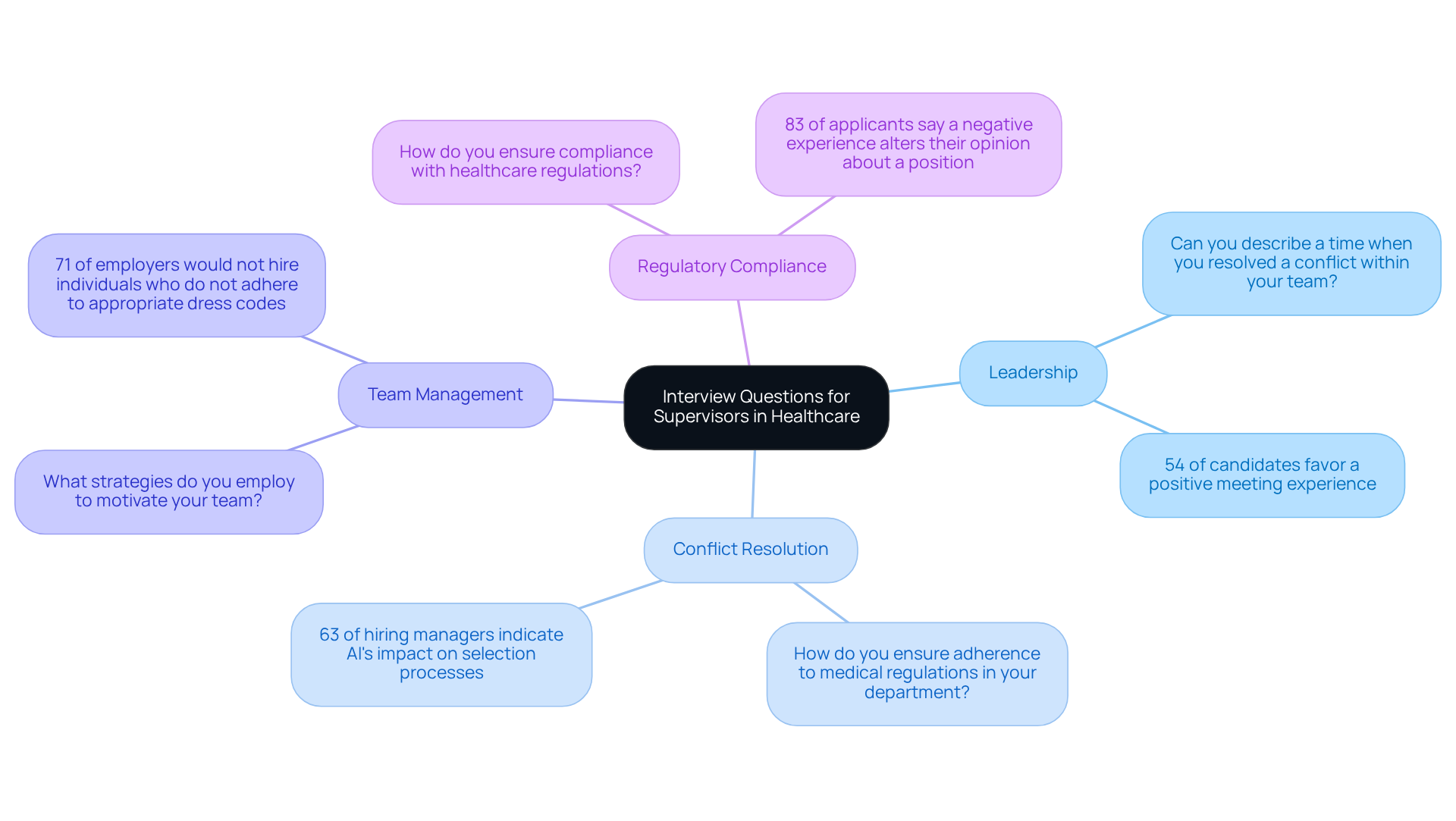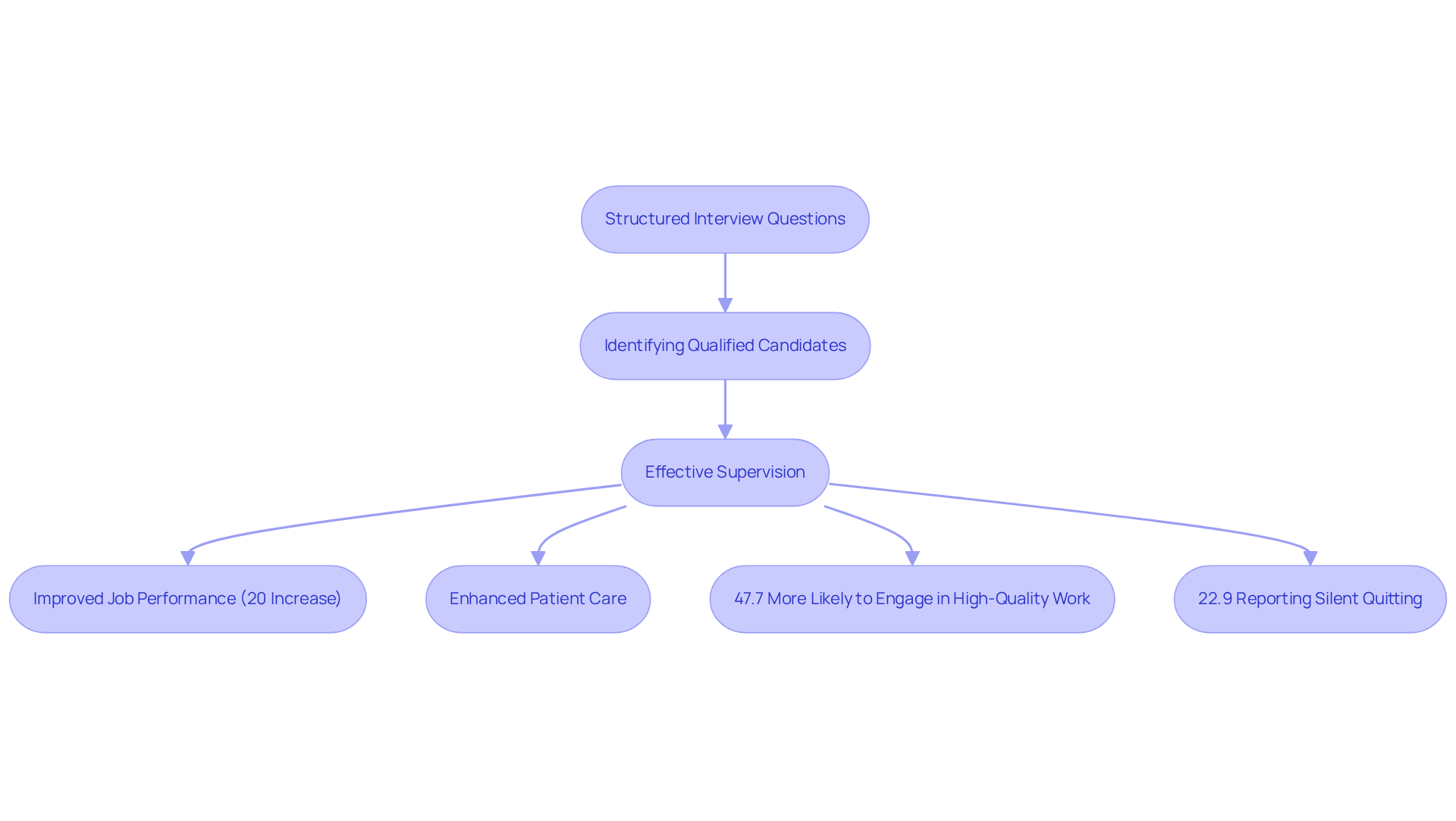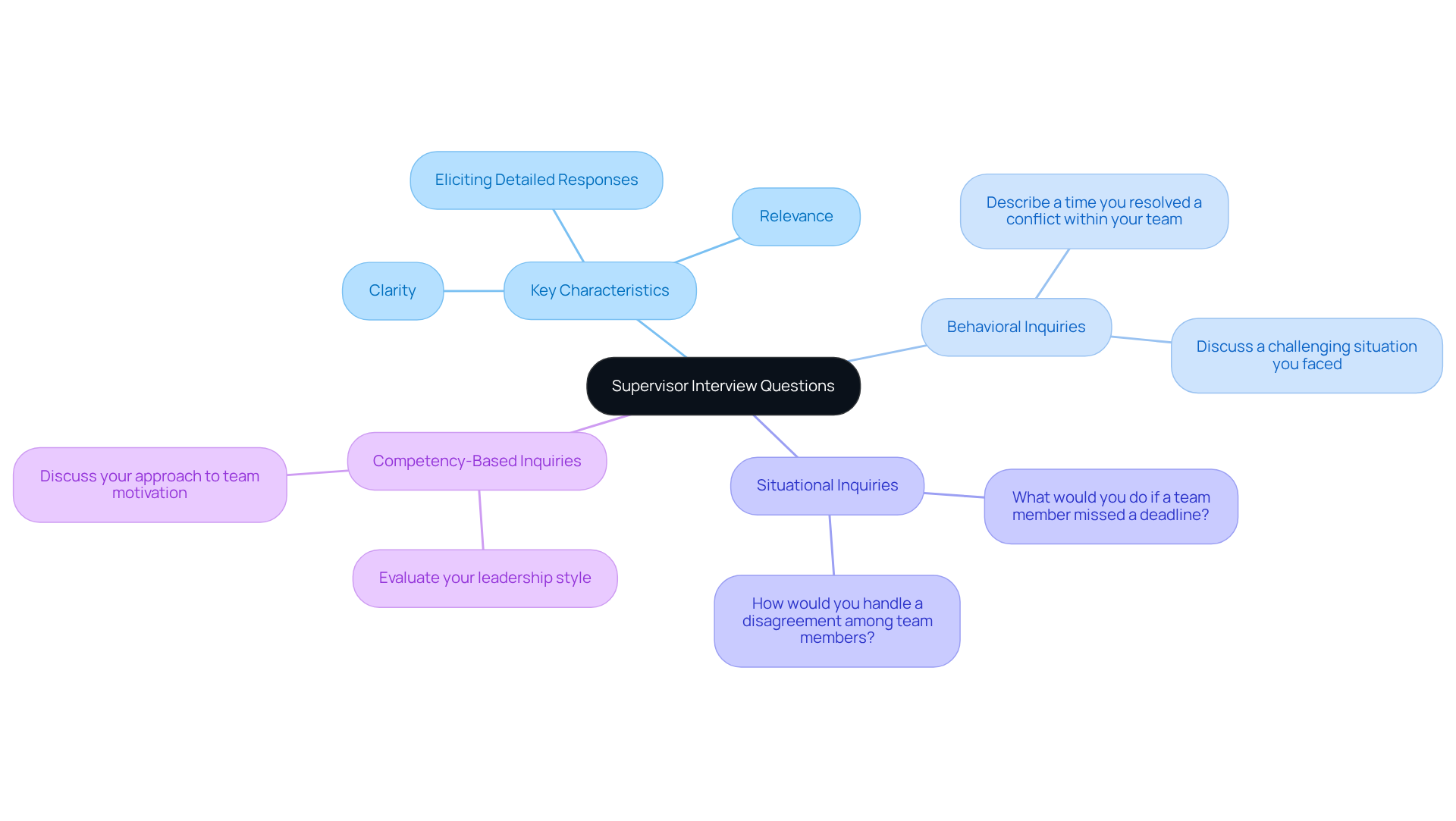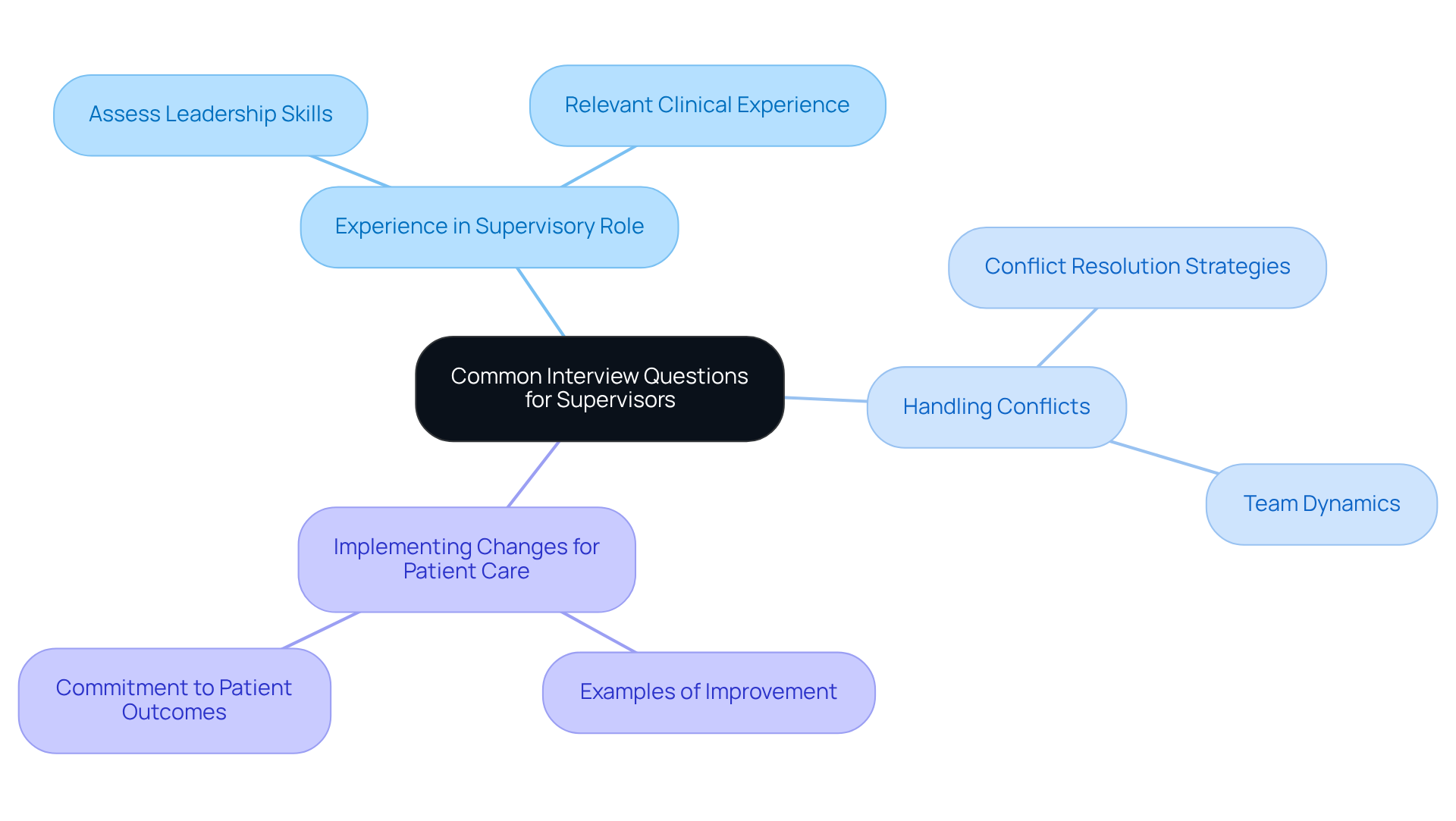July 6, 2025

The article examines the critical importance of crafting interview questions for supervisors in the healthcare sector, underscoring their pivotal role in assessing leadership skills and competencies vital for effective management. By detailing how targeted questions can pinpoint candidates who resonate with organizational values and enhance patient care, it illustrates the profound impact of structured interviews on job performance and trust within clinical teams.
In the intricate realm of healthcare, supervisors play a crucial role in ensuring operational efficiency and delivering high-quality patient care. Crafting effective interview questions for these positions not only identifies the right leaders but also aligns with organizational values and enhances team dynamics. As the hiring process evolves with technology and shifting expectations, healthcare organizations must consider: how can they select candidates who will excel in this demanding environment? This article explores the essential characteristics and types of interview questions that can revolutionize the recruitment process for healthcare supervisors, ultimately influencing patient outcomes and workplace morale.
Interview questions for supervisors in healthcare are intentionally crafted to evaluate the qualifications, skills, and competencies that are crucial for supervisory roles. These inquiries emphasize leadership capabilities, conflict resolution, team management, and compliance with regulatory standards. Notably, 63% of hiring managers indicate that AI and automation are changing selection processes, highlighting the necessity for applicants to demonstrate adaptability in a technology-focused setting. By analyzing candidates' responses, hiring managers can evaluate their potential to effectively oversee clinical staff and uphold high-quality patient care.
Effective interview questions might include:
Recent data reveals that 54% of individuals with a favorable meeting experience are more inclined to accept a job offer. This underscores the importance of a well-organized assessment procedure. Furthermore, 71% of employers would not hire individuals who do not adhere to appropriate dress codes, emphasizing the significance of professionalism in medical environments. Additionally, 83% of applicants state that a negative experience during the selection process alters their opinion about a position they previously favored, reinforcing the necessity for a supportive atmosphere.
HR specialists stress that evaluating qualifications for supervisory positions in the medical field necessitates using interview questions for supervisors that include a mix of behavioral and situational inquiries to measure candidates' practical problem-solving skills. The impact of extends beyond recruitment; they can significantly influence healthcare outcomes by ensuring that capable leaders are positioned to direct clinical teams efficiently. Optimal methods for 2025 recommend integrating technology, such as virtual discussions and AI-driven evaluations, to enhance the hiring process while maintaining a focus on interpersonal skills and cultural fit. Considering that only 20% of all candidates progress to the selection stage, effective strategies for discussions are essential in this competitive environment.

In the medical field, interview questions for supervisors are crucial, significantly influencing the quality of leadership within clinical teams. Effective supervisors are vital for maintaining operational efficiency, ensuring compliance with healthcare regulations, and fostering a positive work environment. By posing targeted questions, hiring managers can identify candidates who not only possess the necessary skills but also align with the organization's values and mission, ultimately enhancing patient care and staff morale.
Consider this: organizations employing structured interview processes report a 20% improvement in job performance among new hires, which translates directly to enhanced patient outcomes and satisfaction. This improvement is further supported by the statistic that can also yield a 20% increase in job performance, underscoring the importance of effective leadership practices.
Moreover, the influence of effective supervisors extends beyond immediate operational metrics. Research reveals that medical professionals who have confidence in their supervisors are 47.7% more likely to engage in high-quality work, leading to improved patient care. Additionally, 43.7% of medical workers who trust their leadership feel valued by their leaders, highlighting the critical relationship between trust and effective leadership. Conversely, inadequate supervisory methods can result in a disengaged workforce, with 22.9% of medical professionals reporting silent quitting due to insufficient leadership.
In conclusion, the strategic application of interview questions for supervisors is essential for identifying leaders who can foster a culture of excellence in medical environments, ultimately enhancing both patient care and staff morale. Almost all (97.7%) healthcare workers indicated that their level of trust in leadership significantly impacted their professional experience, further emphasizing the importance of trust in leadership roles.

Key characteristics of interview questions for supervisors are clarity, relevance, and the capacity to elicit detailed responses. These interview questions for supervisors are critical in the hiring process, as they help identify the most suitable candidates.
Common types of interview questions for supervisors include:
For instance, consider a behavioral inquiry that asks, 'Can you describe a time when you resolved a conflict within your team?' This method allows interviewers to in the past, providing invaluable insights into their capabilities.

In healthcare environments, supervisors often face critical interview questions for supervisors that are designed to assess their leadership capabilities. Consider these typical questions:
These interview questions for supervisors are designed to , problem-solving skills, and commitment to enhancing patient outcomes. By preparing for these inquiries, candidates can effectively demonstrate their qualifications and readiness for the supervisory role.

The pivotal role of supervisors in healthcare underscores the necessity for interview questions specifically tailored to these positions. By emphasizing leadership abilities, conflict resolution, and a commitment to compliance, hiring managers can effectively identify candidates who will not only uphold high standards of patient care but also cultivate a positive work environment. The integration of technology and structured interview processes significantly enhances the likelihood of selecting capable leaders who can adeptly navigate the complexities of modern healthcare settings.
Key insights from the article highlight the importance of well-crafted interview questions that incorporate behavioral, situational, and competency-based inquiries. These questions are instrumental in assessing candidates' past experiences, problem-solving skills, and alignment with organizational values. Statistics indicate that structured interviews can lead to substantial improvements in job performance and patient outcomes, emphasizing the direct correlation between effective hiring practices and the overall quality of care delivered in healthcare environments.
Ultimately, the strategic application of targeted interview questions serves as a foundational step in fostering strong leadership within healthcare organizations. By prioritizing the selection of supervisors who inspire trust and promote engagement among their teams, healthcare facilities can enhance not only staff morale but also the quality of care provided to patients. Embracing these practices is critical for any healthcare organization aiming to thrive in a competitive landscape while ensuring excellence in patient care and operational efficiency.
What is the purpose of interview questions for supervisors in healthcare?
Interview questions for supervisors in healthcare are designed to evaluate qualifications, skills, and competencies essential for supervisory roles, focusing on leadership, conflict resolution, team management, and compliance with regulatory standards.
How are AI and automation impacting the selection process for supervisors?
AI and automation are changing selection processes, with 63% of hiring managers indicating that applicants must demonstrate adaptability in a technology-focused environment.
What kind of interview questions are effective for evaluating supervisory candidates?
Effective interview questions include behavioral and situational inquiries, such as 'Can you describe a time when you resolved a conflict within your team?' and 'How do you ensure adherence to medical regulations in your department?'
What is the significance of a favorable meeting experience during the hiring process?
A favorable meeting experience increases the likelihood of candidates accepting job offers, with 54% of individuals indicating they are more inclined to accept if they have a positive experience.
How does professionalism affect hiring decisions in healthcare?
Professionalism is crucial, as 71% of employers would not hire individuals who do not adhere to appropriate dress codes.
What impact does a negative selection process experience have on candidates?
A negative experience during the selection process can alter candidates' opinions about a position they previously favored, with 83% of applicants stating this is the case.
What strategies should be used to evaluate candidates for supervisory positions in the medical field?
HR specialists recommend using a mix of behavioral and situational inquiries to assess candidates' practical problem-solving skills.
How can well-crafted interview questions influence healthcare outcomes?
Well-crafted supervisor inquiry questions can significantly impact healthcare outcomes by ensuring capable leaders are positioned to effectively direct clinical teams.
What methods are recommended for enhancing the hiring process in 2025?
Recommended methods include integrating technology such as virtual discussions and AI-driven evaluations while maintaining a focus on interpersonal skills and cultural fit.
What percentage of candidates typically progress to the selection stage?
Only 20% of all candidates progress to the selection stage, highlighting the importance of effective discussion strategies in a competitive hiring environment.
Our expert recruitment strategies and AI-driven sourcing ensure that you receive top-notch candidates quickly, without compromising on quality. Whether you’re looking for BCBAs, Clinical Directors, or RBTs, we’ve got you covered.